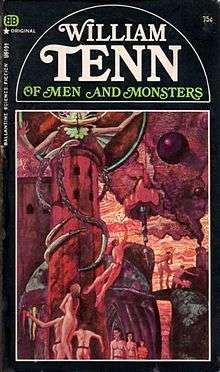Of Men and Monsters
 First edition | |
| Author | William Tenn |
|---|---|
| Cover artist | Stephen Miller[1] |
| Country | United States |
| Language | English |
| Genre | Science fiction |
| Publisher | Ballantine Books |
Publication date | June 1968 |
| Media type | Print (hardback & paperback) |
| Pages | 251 pp |
| OCLC | 5086030 |
Of Men and Monsters is a science fiction novel written by William Tenn, published in June 1968 as a paperback by Ballantine Books. The book is an expansion of his story The Men in the Walls, originally published in Galaxy Science Fiction in October 1963.[2] Of Men and Monsters is Tenn’s only full-length novel, as the majority of his other stories are novellas.[2][3]
Plot summary
The storyline introduces giant, technologically superior aliens who have conquered Earth. People live like vermin in holes in the insulation material of the walls of the homes the monsters have built, sneaking out to steal food and other items from the aliens. A complex social and religious order has evolved, with women preserving knowledge and working as healers, while men serve as warriors and thieves. For the aliens, human beings are just a nuisance, neither civilized nor intelligent, and are generally regarded as vermin to be exterminated.[4]
The novel opens with the story of Eric, a boy who is a member of a tribe that calls itself "Mankind". In order for Eric to become an adult, he must undergo a ceremonial rite of passage in which he must venture out on his own into monster territory and steal some item from them which the tribe can then use for themselves. As he is about to embark on his adventure, Eric learns that his uncle has been a secret supporter of a very different philosophy - the idea that "Ancestor-Science" failed to repel the aliens when they first came and therefore to seek the old "science" would be futile. It would be wiser to try and gain knowledge of "Alien-Science" and then to turn it against the monsters. Eric goes out into alien territory to prove himself and ends up meeting some more people who also believe that alien science is the answer to escaping from their predicament. However, on his return to the burrows, Eric finds an insurrection led by his uncle has failed and he is now an outcast. What follows is Eric's journey from boy to man, from follower to leader and ultimately from captivity to deliverance.[5]
Reviews and reception
Science Fiction Weekly wrote that the novel was an "imaginative and often witty portrait of humanity living like insects in the walls and along the floorboards of gigantic alien monsters who no doubt see themselves as comfortable suburbanites beset by a persistent roach problem." They also criticized the characterization, writing that it "is both simple and schematic...nobody's interesting, not even the hero, and some of the people exist only to deliver long expository speeches on behalf of the author."[6]
Jo Walton wrote that "the book is simultaneously an adventure story taking itself seriously and a parody of an adventure story, played for laughs. It gets a lot of mileage out of the idea of what intelligent mice or cockroaches would conclude about human houses...but beyond all this, it has an entirely unpredictable and unexpected ending — a happy ending, a funny ending, an emotionally satisfying ending, but an ending that’s typically, wryly, and exclusively Tenn."[3]
Publication
The book was originally published in June 1968 by Ballantine in a mass market paperback edition. More reprints have followed through the years, including a Gollancz Science Fiction Collectors' Edition.[4] Other language editions and reprints include:[7]
- 1969 - Gli uomini nei muri (Mass market paperback in Italian) by Mondadori, Urania #521
- 1972 - Von Menschen und Monstren (Paperback in German) by Heyne
- 1991 - Lidé a Netvoři (Paperback in Czech) by Ivo Železný
- 2001 - Here Comes Civilization (Hardback in English) by NESFA Press
- 2011 - Of Men and Monsters (Kindle edition in English) by Gateway
Author
William Tenn was the pen name of Philip Klass. Klass said he could not remember why he chose the pseudonym William Tenn for writing his science fiction stories, but editors would not let him publish under his real name once he had gained a reputation for writing under the name of Tenn. He wrote dozens of short stories and essays, and in 2001 NESFA Press reprinted his complete works in three volumes - Immodest Proposals and Here Comes Civilization, (fiction collections), and Dancing Naked, (non-fiction collection). His stories have been translated into French, German, Russian, Japanese and other languages. Klass died in 2010 at the age of 89.[8][9]
References
- ↑ "Publication: Of Men and Monsters". The Internet Speculative Fiction Database.
- 1 2 Joachim Boaz (September 10, 2013). "Book Review: Of Men and Monsters, William Tenn (1968)". Science Fiction Ruminations.
- 1 2 Jo Walton (October 28, 2009). "No catastrophes here: William Tenn's Of Men and Monsters". Tor.com.
- 1 2 William Tenn (2001). Of Men and Monsters (Reprint ed.). Gollancz. ISBN 978-0-575-07234-3.
- ↑ John Berylne. "Of Men and Monsters by William Tenn". SF Revu.
- ↑ Adam-Troy Castro (March 18, 2002). "Of Men and Monsters". Sci-Fi Weekly. Archived from the original on February 26, 2009.
- ↑ "Of Men and Monsters, Editions". Good Reads.
- ↑ Gerald Jonas (February 13, 2010). "William Tenn, Science Fiction Author, Is Dead at 89". The New York Times.
- ↑ Steven Levy (February 8, 2010). "Farewell, William Tenn. And, Thanks". Wired.
External links
- Of Men and Monsters title listing at the Internet Speculative Fiction Database
- Official Page of William Tenn
- Reviews of William Tenn's Work
- An Interview with William Tenn by Dave Truesdale and Paul McGuire III of Tangent
-
 The Men in the Walls public domain audiobook at LibriVox
The Men in the Walls public domain audiobook at LibriVox